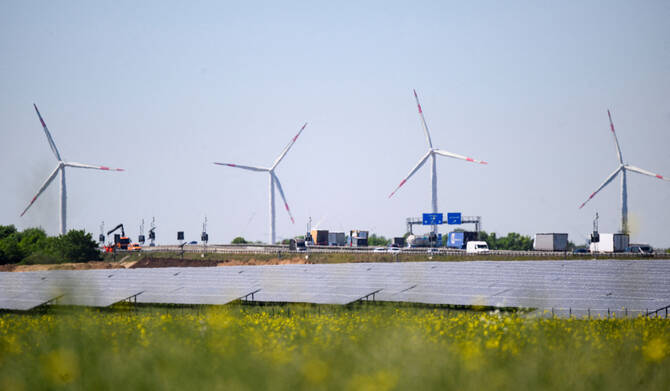
- ARAB NEWS
- 19 Jul 2025

Artificial intelligence and its accompanying infrastructure of data centers have become a defining technology within the global economic competition. This new need will have a direct impact on energy, with an expected surge in electricity demand. The need for high-capacity and stable power is making energy infrastructure a central focus of any nation’s digital expansion.
Indeed, without ample energy capacity, countries will be left behind. Needless to say, this puts the Gulf region in a great position, yet Europe will still need to figure out its way. There is no doubt that after years of misguided all-green obsession, many are now waking up to harsh realities. The disconnect between policymakers and the real world was symbolized in the energy field.
We are finally witnessing a return to sanity. One energy source that had been attacked was perhaps one of the most efficient, even on emissions: nuclear power. It was what put France back on top of the European order and brought Germany to its knees. I have written this often and will never tire of saying it: Merci, Gen. de Gaulle. Indeed, today, if France has a greater chance at leadership in AI and tech, it is thanks to its nuclear power. It is also worth noting that on this point, President Emmanuel Macron was capable of making a U-turn and, after being negative on it, has once again pushed forward on nuclear energy.
We are also seeing other European countries follow the same path. Italy’s plan focuses on deploying advanced small modular reactors and advanced modular reactors to complement renewable energy sources. The government anticipates finalizing the legislative framework by the end of 2027, with projections indicating that nuclear energy could supply between 11 percent and 22 percent of the country’s electricity by 2050.
We are finally witnessing a return to sanity
Khaled Abou Zahr
In Germany, while the previous government completed a nuclear phase-out in 2023, the new administration under Chancellor Friedrich Merz is reconsidering this. Merz has criticized the earlier shutdowns and is exploring the development of small modular reactors, as well as potential collaborations with France on nuclear initiatives.
The main issue with renewables is their intermittent nature and the continuous need for subsidies. Moreover, in a time of unstable international trade, most equipment comes from China, which poses a supply chain risk. We saw during the global pandemic how the pharma industry supply chain suffered due to its location in India. When it comes to manufacturing for solar, most production takes place in China. This is also a geopolitical and influential advantage for Beijing.
While it is clear there are geopolitical consequences to any country’s energy mix, there should never be a political, dogmatic view on economic decisions. This is the mistake Europe fell into for energy, and many other business and societal decisions. The European left, in alliance with Green parties, has imposed policies driven by ideology and not economic realism. Among these decisions were the hasty decommissioning of nuclear power, unrealistic decarbonization goals, and placing renewables on a pedestal. This is a topic that has deepened the divide between left and right.
Will Europe be capable of shifting this trend and making the right decisions? It is clear that without nuclear power this will be impossible, and relying solely on renewables is a dangerous policy. Redundancies in power sources and distribution are an absolute necessity. The widespread blackout that hit Spain and Portugal last April is a stark reminder. The crisis was caused by a loss in a substation in Granada, followed by failures in Badajoz and Seville, which subsequently caused Spain’s grid to disconnect from the broader European network and collapse within seconds. Political figures and energy executives pointed to Spain’s increasing reliance on solar and wind power as a major contributing factor. This is also why, following this incident, other experts have ruled out a short-term rapid transition to net zero and said that the immediate exclusion of fossil and nuclear energy was unrealistic.
Renewables are heavily subsidized in Europe
Khaled Abou Zahr
Another important point is that renewables are heavily subsidized in Europe, which can complicate the region’s ability to compete globally. On top of that, layers of subsidies are being added — not just for renewable energy generation, but also for emerging technologies, startups, and scale-ups. While these measures seek to enhance innovation and energy transition, they ultimately place a financial burden on taxpayers and risk undermining Europe’s competitiveness. In many cases, the main beneficiaries are external suppliers, such as Chinese manufacturers of solar panels or foreign providers of cloud infrastructure, rather than European industry or innovation.
The reality is that following this new technology dominance race, there will be a need to do more than push fast for nuclear energy. For France, nuclear energy accounted for about 40 percent of its total energy supply. Moreover, nuclear power accounts for 65 percent of electricity generation. This is what has enabled France to position itself as the cornerstone of the new AI-led economy while other European countries lag. The announcement of new AI-focused data centers in Arizona close to nuclear plants confirms this trend. It is also worth mentioning that beyond ideological views, Paris maintains one of the lowest-carbon electricity grids globally.
As we notice a bigger competition, not to say war, for AI with clear geopolitical alignments, Europe will need to sort out its energy mix and reintroduce nuclear energy as a main provider. There is no time to lose on this path, and the risks are too high to ignore. They should be inspired by the strategic foresight of Gen. de Gaulle, who understood the geopolitical independence nuclear energy would grant France.
• Khaled Abou Zahr is the founder of SpaceQuest Ventures, a space-focused investment platform. He is CEO of EurabiaMedia and editor of Al-Watan Al-Arabi.